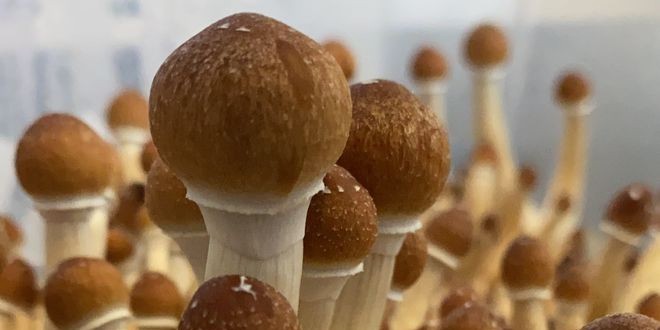The 1960s, countercultural members of the American “baby boom” generation used hallucinogenic drugs like LSD (lysergic acid diethylamide), psilocybine (“magic mushrooms”), mescaline and marijuana as a means of “expanding consciousness and introspection.”
But they were not innovators – the plant-based ancient psychedelic substance called ayahuasca was found by archaeologists inside a shamanic pouch made of fox snouts 1,000 years ago. The mushrooms were depicted in Stone Age rock art in Africa and Europe, and are most famously represented in the pre-Columbian sculptures and glyphs seen throughout North, Central, and South America.
Some hallucinogens have been found useful for medical problems and not just getting high. A novel nasal-spray nano-formulation enables nose-to-brain delivery of biodegradable nanoparticles that can encapsulate the active ingredient in “magic mushrooms” for the treatment and prevention of post-traumatic stress disorder (PTSD)
The technology was developed by Prof. Amnon Sintov of Ben-Gurion University of the Negev (BGU) in Beersheba and licensed from BGN Technologies, the university’s technology-transfer company, which is presenting it at the Biomed Israel conference in Tel Aviv.
Madrigal Mental Care, a biopharmaceutical company in Beersheba, which developed the technology, focuses on pharmaceuticals and medical delivery systems for psychiatric problems. The company said it has “redefined the future of mental health care through a patented groundbreaking technology based on psychoactive substances.”
The company’s co-founder, chairman and CEO is David Gabay, an entrepreneur, writer and musician with extensive experience in managing diverse systems and leading complex business processes.
His advanced nanotechnology-based system is a breakthrough nasal spray that enables nose-to-brain delivery of organic nanoparticles. These biodegradable nanoparticles encapsulate molecules of psychedelic substances like psilocybin, as well as ketamine, mescaline, MDMA and others.
The technology ensures a focused and fast delivery of accurate doses of psychoactive substances, said Gabay. “The nanoparticles are biodegradable and provide a significant advantage over common practices in terms of stability and accuracy. In-vitro studies, which were carried out by Prof. Shimon Ben-Shabat from BGU’s department of biochemistry and pharmacology, show that the psilocybin doses used in the nanoparticles have a beneficial effect on inflamed brain cell cultures.”
“An increasing number of studies point to the advantages of using psychedelic drugs for the treatment of psychiatric disorders such as PTSD, depression, anxiety, obsessive compulsive disorder and even addiction, with low doses,” said Sintov. “Due to their powerful effect on the human brain, it is imperative to be able to deliver these drugs in a safe manner and in precise doses. Our novel nanotechnology platform enables encapsulation of precise drug doses in nanoparticles that are delivered directly to the brain via an intranasal spray, in a very efficient, fast and safe manner.”
Symptoms of PTSD, which can affect people that experience traumatic or life-threatening events, may start within one month of a traumatic event or appear years later and include significant problems in social or work situations and in relationships. Patients find it difficult to perform daily functions for an extended period of time. Symptoms include intrusive memories, avoidance, negative changes in cognition and mood and changes in physical and emotional reactions. It is estimated that 3.5% of adults in the US alone suffered from PTSD in the past year.
Treatment of PTSD traditionally includes psychotherapy as well as medications that affect the neurotransmitters serotonin or norepinephrine (SSRIs and SNRIs). The remission rate of these treatments reaches approximately 50% at best, so a novel approach was needed. Recent years have seen increasing interest in treating PTSD with psychedelic drugs, including psilocybin, MDMA (known as Ecstasy), and LSD.
Since 2019, over 40 clinical trials have been launched exploring psychedelics for the treatment of psychiatric conditions, including PTSD. A Phase-3 clinical trial for treating PTSD with MDMA showed that two months after treatment, 67% of participants in the MDMA group no longer qualified for a diagnosis of PTSD, compared with 32% in the placebo group. The psychedelic market is expected to reach $40billion by 2027 in the medical arena alone.
The BGU team is currently beginning preclinical trials with rodents with the aim of achieving efficacy and safety approvals to begin first-in-human clinical trials next year. “We have great confidence that this novel technology, that offers a new will propel forward the field of psychedelic-based treatments, for the benefit of millions of people around the world coping with chronic and acute psychiatric conditions such as PTSD and depression,” said Ben-Shabat.
Dr. Galit Mazooz Perlmuter, senior vice president of business development for bio-pharma at BGN Technologies added: “There is a vast need for better treatments for PTSD and other mental disorders. We have filed a patent application to protect this unique approach, which is an excellent example of the kind of breakthrough technologies originating from top scientists at BGU.”
The shortcode is missing a valid Donation Form ID attribute.



